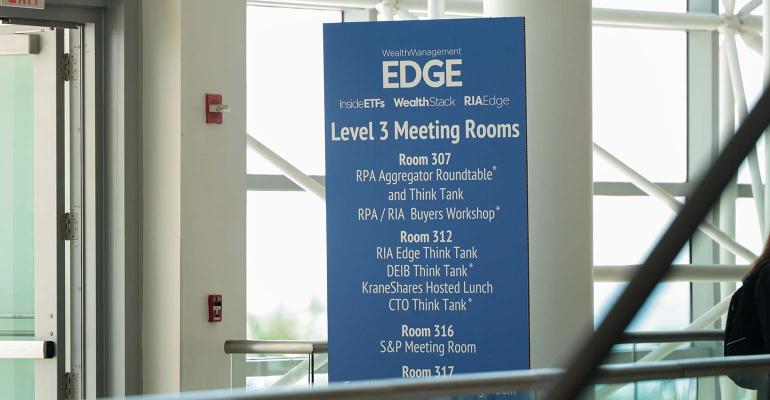At the gathering of the sixth annual RPA Aggregator Roundtable and Thinktank hosted by WealthManagement.com at the Wealth Management EDGE conference last week, key leaders came together to discuss the state of the defined contribution industry.
The defined contribution industry faces what seems like an existential crisis, described in Wikipedia as:
… inner conflicts characterized by the impression that life lacks meaning or by confusion about one's personal identity. Existential crises are accompanied by anxiety and stress, often to such a degree that they disturb one's normal functioning in everyday life.
The opportunities to provide workers access to retirement plans at employers currently not offering one, as well as making financial planning an affordable employee benefit that should include lifetime income options, are also the industry’s biggest challenges. While the group agreed that prospects to help and work with participants in their plans provided the biggest opportunities, along with refining and integrating the businesses that many have acquired, they also agreed that engaging participants providing financial planning at scale through data and AI are their top issues.
These RPA aggregators are the tip of the spear as the DC industry rolls up its sleeves to attack the challenges and leverage the opportunities that the government and society has presented recently through state mandates, SECURE 2.0 and the general feeling that all workers should have access to retirement planning as well as holistic financial and benefit advice at the workplace. Driven by high valuations and expectations of private equity firms that have invested in RPA aggregators and fee compression that drives consolidation for both record keepers and RPAs, the search for revenue beyond plan fees has accelerated.
One roundtable participant quipped that DC platforms are driven by “yesterday’s technology tomorrow” —meanwhile, the Department of Labor and courts have made the use and sharing of participant data more difficult than it needs to be, opening the door for big tech providers to access participants outside of the plan leveraging AI and smart use of data with IBM and Amazon looming and Google not far behind. And while advisors and providers realize that they must collaborate, they struggle if they focus solely on their own self-interests and lack of awareness that all parties must benefit.
But the stakes are too high with the potential of millions of new plans flooding a system ill-equipped to handle them as DC plans not only look to replace defined benefit plans, which will only occur if lifetime income is made available rather than IRA rollovers, but to be even more beneficial through holistic wellness programs. At their height, DB plans only covered 18% of workers at less than 50% of the companies, which is ironic as we criticize DC plans for covering “only” 50% of the workforce.
Fueled by PE money with many record keeper partners open and willing to collaborate with these larger aggregator groups, many owned by benefits firms that know how to leverage data and have access to tens of thousands of clients, there was decided optimism among the group.
One firm entrenched in the equity or ESOP business offered a business model that many in the DC industry has publicly eschewed but which it is moving towards—plan level advisor services and record keeping at no cost. UBS, Morgan Stanley, Fidelity Investments and JPMorgan Chase give away equity plan services in exchange for the opportunity to offer wealth services to the participants. And if you think this is a bad model, look at the valuations paid by Morgan Stanley for Solium and E-Trade as well as the quality and acumen of the firms involved.
On its own, with limited technology and expertise, the DC industry will not be able meet the challenges or leverage the immense opportunities offered through worksite retirement platforms. They must leverage technology used by the wealth management industry while offering advice like ESOP programs and scale financial planning by copying or collaborating with tech and AI giants learning from benefits consultants on how to better deploy employee data.
It is a true existential crisis, which will force pretenders that cannot live up to the high expectations and valuations of their PE firms to sell, likely requiring more skilled leaders from outside the home-grown DC industry. The stakes are too high and the opportunities too immense to ignore with our best hope clearly with the RPA aggregators who gathered at the recent roundtable and thinktank this past month.
Fred Barstein is founder and CEO of TRAU, TPSU and 401kTV.





